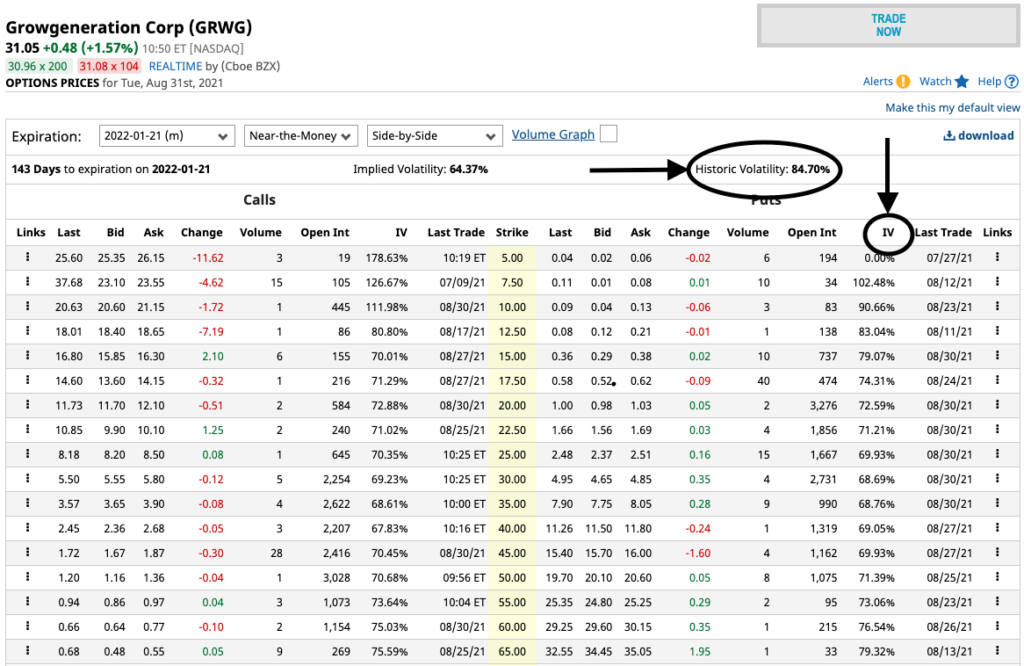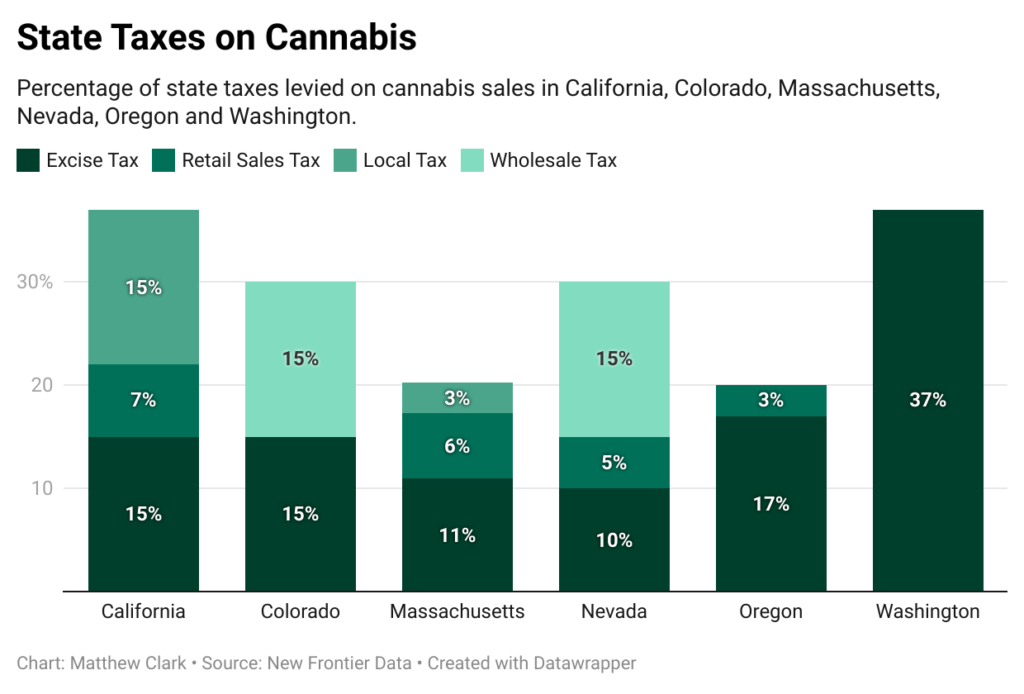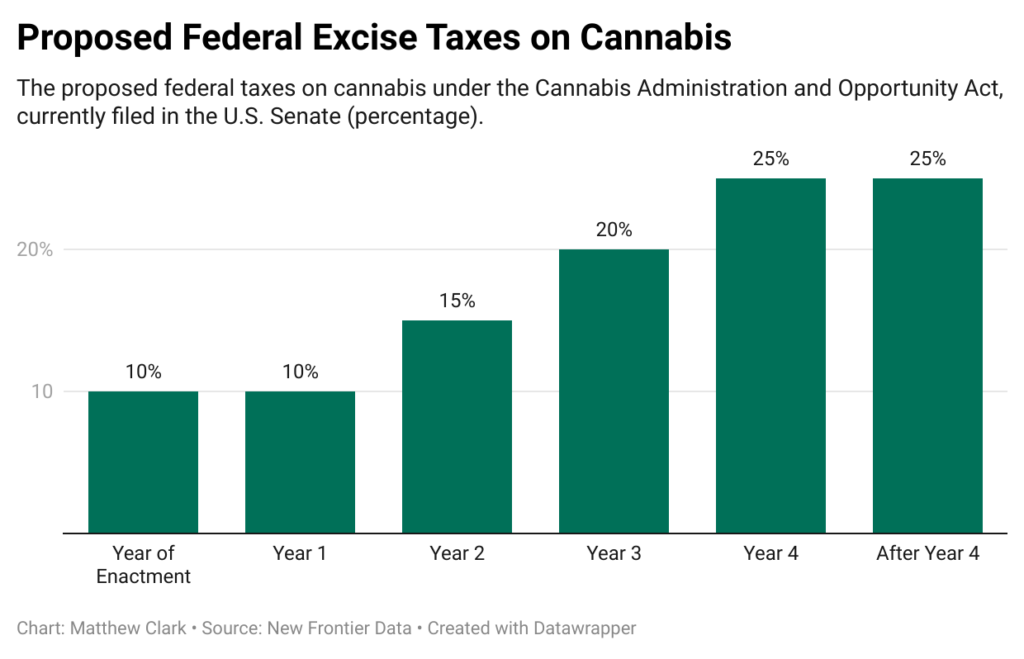In the latest Marijuana Market Update, I cover:
- A question about buying cannabis stock options.
- Why taxes could hamper federal legalization of cannabis.
Jim emailed me to say:
I’m enjoying Matt’s output on the cannabis market, and I’m glad I joined the community as a premium member. I would like to hear Matt’s thoughts on options on cannabis stocks. Thanks.
Thank you for the question, Jim. Be on the lookout; my team will reach out to send you some Money & Markets swag.
Options on Cannabis Stocks
To refresh, there are two main types of options you can buy:
- Call option — Gives you the right to buy a stock in the future at a predetermined price.
- Put option — Gives you the right to sell a stock in the future at a predetermined price.
The beauty of buying call or put options is that you limit your losses to what you pay. Call options have unlimited maximum gain potential while put options have limited maximum gain.
Call options are a bullish view of the underlying asset while put options are bearish.
Call option buyers look for the stock price to be at or above the strike price of the option.
Put option buyers look for the stock price to be at or lower than the strike price.
There is much more to it, of course, but those are the broad strokes.
I recorded an episode of Ask Adam Anything with our chief investment strategist, Adam O’Dell, about how to make money with options. (You can check out that video here.)
In that video, Adam brought up a number you should know before you buy an option: the implied volatility.
This is the annualized volatility investors expect from the stock. It’s a factor in the price of an option.
Before buying an options contract, you should compare the implied volatility with the historic volatility (or actual volatility).
An option is underpriced if the historic volatility is higher than implied volatility.

Above, you can see an options chart for GrowGeneration Corp. (Nasdaq: GRWG), one of our Cannabis Watchlist stocks. The options expire on January 21, 2022.
You can see that each option has a different implied volatility. Compare that with the 84.7% historical volatility to find an underpriced option contract to buy.
Now, there is a little more to it than that, but this gives you a start.
In terms of what cannabis options I think you should buy, it all depends on whether you are bearish or bullish on cannabis stocks. Then, of course, you must determine just how bullish or bearish you are.
I don’t recommend options for the Cannabis Watchlist, but I’m willing to look. If you have a stock you want me to look at for options contracts, email me at feedback@moneyandmarkets.com.
But remember, the options game is not as straightforward as buying and selling stocks.
Jim, again, thanks for your question and for joining our exclusive membership program on YouTube.
Look out for an email from my team so we can send you Money & Markets merchandise.

You, too, can get Money & Markets swag by submitting a question for me, Adam O’Dell or Charles Sizemore that we use in any of our videos. Just send us your questions and feedback.
Taxes and the Cannabis Industry
Now, about cannabis legalization.
Death and taxes: the only things that are guaranteed in life.
For the cannabis industry, taxes take on a whole different meaning.
Because it is federally illegal, cannabis companies are taxed under a provision in U.S. Code that does not allow them to deduct a lot of their standard operating expenses.
According to New Frontier Data, a cannabis data research company, most cannabis companies pay around 60% in taxes. Compare that to the standard business tax rate in the U.S. of just 21.5%.

As you can see with this chart, those higher taxes are passed on to consumers who pay as much as 37% in taxes in states such as California and Washington.
Users who buy cannabis don’t seem to mind the higher taxes as cannabis sales across the country continue to rise.
Under the proposed Cannabis Administration and Opportunity Act, cannabis would essentially become a legal business, and companies would not be subject to the same taxes they are now under U.S. Code.
However, that may be of little relief to cannabis companies in the U.S.
Under the proposed bill, which is in the U.S. Senate, companies would pay a federal excise tax.
Transactions between producers and processors, as well as producers and retailers, are subject to the excise tax (according to New Frontier Data).

You can see the proposal in the chart above.
If the bill passes in its current form, and I doubt it will, the excise tax will be 10%.
It goes up to 15%, then to 20%. After the fourth year, that excise tax reaches a cap of 25% of the prevailing sales price in the U.S. per ounce of THC.
New Frontier Data found that the cannabis industry would face higher taxes under the proposed legislation than it does now.
The Big Picture: Cannabis Taxes
Companies pay high state taxes — one of the selling points for legalization. Tossing in a high wholesale excise tax doesn’t do cannabis businesses any favors.
It has the potential to make things difficult for small cannabis operators as well as hinder potential investment and innovation.
Language in the proposed legislation is slick, suggesting that cannabis businesses will see a “tax credit.” Businesses with less than $20 million in sales get a 50% tax credit while those with more than $20 million get a credit on the first $20 million in sales.
However, to get the credit, the companies still have to pay the full amount until the credit is applied — in some cases, that could be a year after taxes are filed.
Companies will pass higher taxes on to consumers in the form of higher retail prices.
This presents a greater problem as the legal market faces headwinds from the illegal market. Higher retail prices for legal cannabis could push some buyers to the cheaper illicit market.
This proposed tax structure also treats all cannabis companies the same. But many cannabis operators operate under a structure know as vertical integration, in which they acquire or establish their own suppliers, distributors, retail locations and more. This proposed tax structure takes away the cost efficiency advantage of that model.
In terms of what this means for cannabis investors, we are very early in the legislative process — the bill hasn’t even garnered a hearing in subcommittees yet.
If the bill passes, I doubt it will be in its current form. We’ll keep an eye out to see if the Senate addresses the tax structure.
Before I sign off, just a note: We’ve scheduled our next live chat on YouTube for 4 p.m. Eastern on Thursday, September 9.
You’ll be able to get on YouTube and ask me about cannabis stocks and the broader cannabis market as well as potential legalization.
YouTube “Join” Feature
We offer members exclusive content, including:
- Interviews with cannabis insiders.
- Blog posts, stock analysis and company breakdowns.
- More content related to our Cannabis Watchlist.
- Monthly live chats with me, where we’ll discuss cannabis stocks, the cannabis sector and much more.
I even unveiled another tool you can use to help point you in the right direction for cannabis stock investments.
Just click “Join” on our YouTube page to find out what you can access by joining.
If you have a cannabis stock you’d like me to look at, email me at feedback@moneyandmarkets.com.
Where to Find Us
Coming up this week, we’ll have more on The Bull & The Bear podcast and our Money & Markets Week Ahead, so stay tuned.
Don’t forget to check out our Ask Adam Anything video series, where we ask any question to chief investment strategist Adam O’Dell, and our Investing With Charles series, in which our expert Charles Sizemore and I discuss the trends you write in to ask about.
Also, you can follow me on Twitter (@InvestWithMattC), where I’ll give you even more insights, not just in the cannabis market.
Remember, you can email my team and me at feedback@moneyandmarkets.com — or leave a comment on YouTube. We love to hear from you!
Safe trading,

Matt Clark, CMSA®
Research Analyst, Money & Markets
Matt Clark is the research analyst for Money & Markets. He is a certified Capital Markets & Securities Analyst with the Corporate Finance Institute and a contributor to Seeking Alpha. Prior to joining Money & Markets, he was a journalist and editor for 25 years, covering college sports, business and politics.







